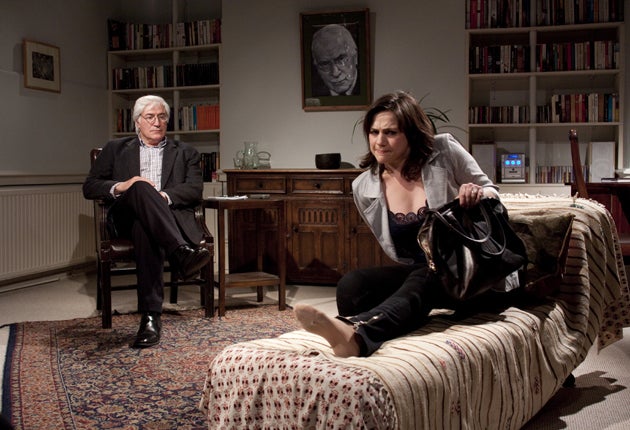Shrunk, Cock Tavern Theatre, London

Your support helps us to tell the story
From reproductive rights to climate change to Big Tech, The Independent is on the ground when the story is developing. Whether it's investigating the financials of Elon Musk's pro-Trump PAC or producing our latest documentary, 'The A Word', which shines a light on the American women fighting for reproductive rights, we know how important it is to parse out the facts from the messaging.
At such a critical moment in US history, we need reporters on the ground. Your donation allows us to keep sending journalists to speak to both sides of the story.
The Independent is trusted by Americans across the entire political spectrum. And unlike many other quality news outlets, we choose not to lock Americans out of our reporting and analysis with paywalls. We believe quality journalism should be available to everyone, paid for by those who can afford it.
Your support makes all the difference.Some marriages end as a result of psychotherapy, but do certain psychotherapists wreck certain marriages?
Fay Weldon thought so. She blamed the collapse of her 30-year union on a manipulative therapist, wrote Affliction in revenge and argued that victims should be able to sue for "alienation of affect".
Similarly vengeful thoughts fire the woman who comes for a first session at the London home of Jungian shrink, Max Goldman, in the blackly comic and disconcerting two-hander Shrunk, Charlotte Eilenberg's long-awaited follow-up to her Olivier Award-winning play, The Lucky Ones. It's premiered now in an absorbing, vividly acted production by Julian Birkett.
Jack Klaff's Max twinkles non-commitally as Amanda Ryan's volatile Celia rehearses her grievances. According to her, a female therapist destroyed her 20-year marriage to a composer who began to blame her for his failing creativity. But, when Max objects to her reading from her spouse's diaries, she pulls a out gun and, in a display of lethal larkiness, reveals him to have been the culprit and subjects him to a taste of his own medicine.
Eilenberg arranges some nice twists, as for example when Max has to go through with a live interview on Radio 4's Mind Matters about his book Who's To Blame? But there have been clues that Celia may not be what we take her to be. And that impression is reinforced by, say, the fact that we learn from the interview that his book discusses, hypothetically, the kind of scenario he is now in.
This dimension of guilty self-questioning complicates the play's meaningful games with the idea of psychotherapeutic accountability. Shrunk creates the elaboration, however, in over-neat ways. The parallels between Celia's relationship and Max's feel a bit forced. But then some may think it a flaw in the play that, ultimately, there is no criterion of accuracy.
To 12 June (0844 477 1000)
Join our commenting forum
Join thought-provoking conversations, follow other Independent readers and see their replies
Comments